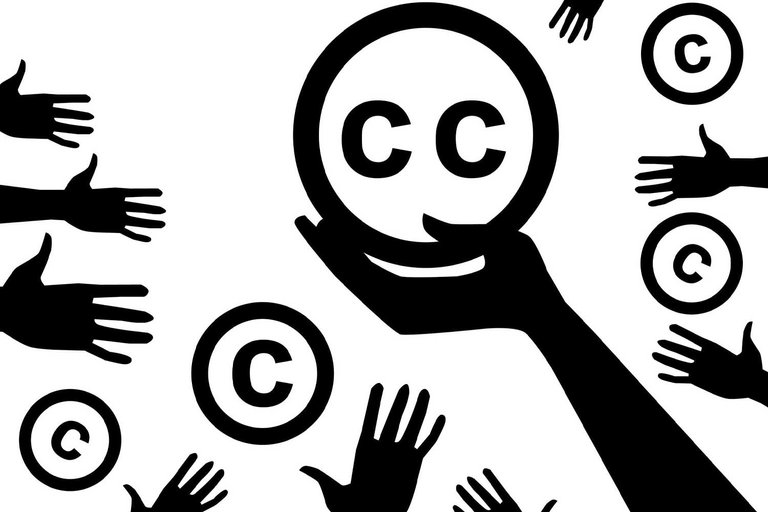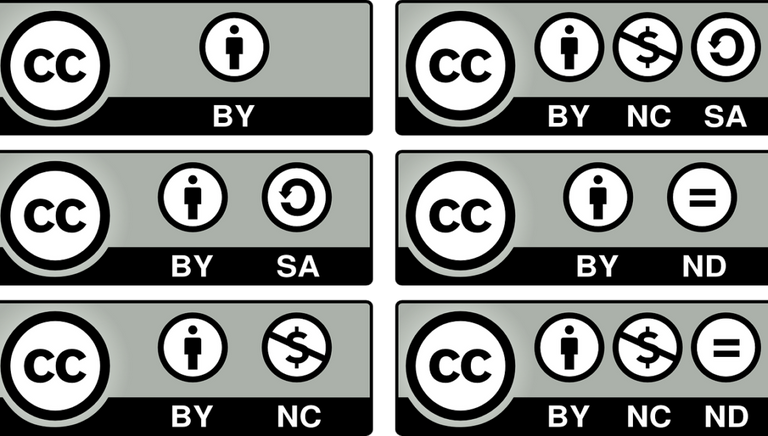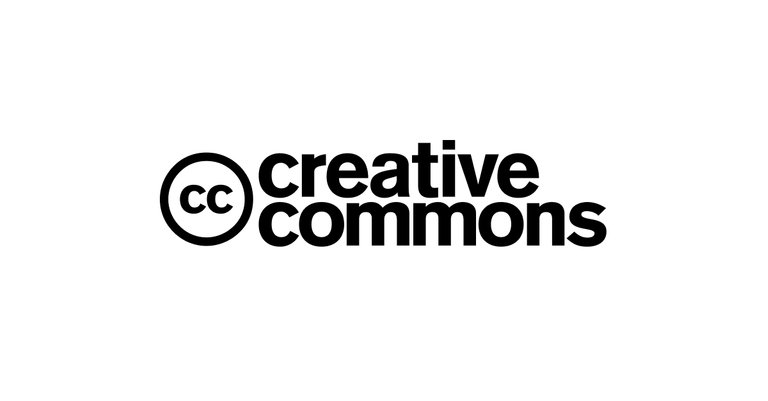Creative Commons Licenses Explained
What is Creative Commons (CC)?
It is a non-profit non-governmental organization (NGO), created in 2001 by Lawrence Lessig (professor of law at Stanford University and specialist in cyber law), that develops plans to help eliminate or reduce legal barriers to the creativity through new legislation and new technologies.

Creative Commons (in Spanish "creative commons" or "creative commons license") is also the name given to the licenses developed by this organization. These Creative Commons or CC licenses are inspired by the GPL (General Public License) of the Free Software Foundation, sharing a good part of its philosophy. The main idea behind them is to enable a legal model aided by computer tools in order to facilitate the distribution and use of content.
There is a series of Creative Commons licenses, each with different configurations, which allows authors to decide the way in which their work will circulate on the Internet, giving freedom to quote, reproduce, create derivative works and offer it publicly under certain different restrictions.
Although they were originally drawn up in English, the licenses have been adapted to various laws in other countries around the world and, among other languages, they have been translated into Spanish, Galician, Basque and Catalan through the Creative Commons International project.
Es una organización no gubernamental sin ánimo de lucro (ONG), creada en el año 2001 por Lawrence Lessig (profesor de derecho en la Universidad de Stanford y especialista en ciberderecho), que desarrolla planes para ayudar a eliminar o reducir las barreras legales de la creatividad a través de nuevas legislaciones y nuevas tecnologías.
Creative Commons (en español “bienes comunes creativos” o “licencia de bienes comunes creativos”) es, también, el nombre dado a las licencias desarrolladas por esta organización. Estas licencias Creative Commons o CC están inspiradas en la licencia GPL (General Public License) de la Free Software Foundation, compartiendo buena parte de su filosofía. La idea principal detrás de ellas es posibilitar un modelo legal ayudado por herramientas informáticas para así facilitar la distribución y el uso de contenidos.
Existe una serie de licencias Creative Commons, cada una con diferentes configuraciones, que permite a los autores poder decidir la manera en la que su obra va a circular en Internet, entregando libertad para citar, reproducir, crear obras derivadas y ofrecerla públicamente bajo ciertas diferentes restricciones.
Aunque, originalmente, fueron redactadas en inglés, las licencias han sido adaptadas a varias legislaciones en otros países del mundo y, entre otros idiomas, han sido traducidas al castellano, al gallego, al euskera y al catalán a través del proyecto Creative Commons International.
Functionality
How the licenses work
Creative Commons licenses are legal texts that make it easier for any author to allow certain uses of his work under certain conditions and requirements and what is not in the license must be requested. It is an alternative to all rights reserved where to use a license, you do not have to ask for permission or do any procedure, just indicate it in the work through the name of the license, the link and the corresponding icon, being the use of the licenses is gratuitous.
Any author can obtain benefits from his work because he maintains the rights, he does not assign them to anyone, he only authorizes them. Reserving commercial uses or not, he can find a way to obtain a direct or indirect benefit from his work.
Licenses are based on intellectual property, therefore, using them does not imply rejecting it. Without intellectual property rights they would not be necessary, since the author should not authorize anything because he would not have any rights recognized.
To be able to license a work under Creative Commons, the main thing is to be the author and the owner of the rights. He can be the author and not the owner if he has given them; in this case, you cannot assign a license, but should ask the new owner for permission. It is only necessary to indicate the type of license and that's it.
You can create new resources as long as we do not have compatibility problems in the licensing requirements. In the original work we should always have a license that allows derivative works and, depending on the requirements, we should keep the license. In addition, we can always use other people's works or fragments under certain conditions, such as the quote or the illustration of the teaching, regardless of the possible license associated with them.
Who must specify the license is the author, but he can also be the owner of the rights. A publisher can agree with an author to publish a work under a certain license and maintain the role of it. A publisher can also select materials with open licenses and create new works or new value-added products.
functionality
Las licencias de Creative Commons son unos textos legales que facilitan a cualquier autor el hecho de permitir determinados usos de su obra bajo unas condiciones y unos requerimientos y lo que no está en la licencia hay que pedirlo. Es una alternativa a todos los derechos reservados donde para utilizar una licencia, no hay que pedir permiso ni hacer ningún trámite, solo indicarlo en la obra mediante el nombre de la licencia, el enlace y el icono correspondientes, siendo el uso de las licencias es gratuito.
Cualquier autor puede obtener beneficios de su obra porque mantiene los derechos, no los cede a nadie, solo los autoriza. Reservándose o no los usos comerciales, puede buscar la manera de obtener un beneficio directo o indirecto de su obra.
Las licencias se basan en la propiedad intelectual, por tanto, usarlas no implica rechazar la misma. Sin derechos de propiedad intelectual no serían necesarias, ya que el autor no debería autorizar nada porque no tendría reconocido ningún derecho.
Para poder licenciar una obra bajo Creative Commons, lo principal es ser el autor y el titular de los derechos. Puede ser autor y no titular si los ha cedido; en este caso, no puede asignar una licencia, sino que debería pedir permiso al nuevo titular. Solo es necesario indicar el tipo de licencia y ya está.
Se puede crear recursos nuevos siempre que no tengamos problemas de compatibilidad en los requerimientos de las licencias. En la obra original deberíamos tener siempre una licencia que permitiera obras derivadas y, en función de los requerimientos, deberíamos mantener la licencia. Además, siempre podemos utilizar obras ajenas o fragmentos en determinadas condiciones, como la cita o la ilustración de la enseñanza, independientemente de la posible licencia que lleven asociadas.
Quien debe especificar la licencia es el autor, pero también puede ser el titular de los derechos. Un editor puede acordar con un autor la publicación de una obra mediante una determinada licencia y mantener su rol. Un editor también puede seleccionar materiales con licencias abiertas y crear nuevas obras o nuevos productos con valor añadido.

1.- Recognition (by)
Any exploitation of the work is allowed, including a commercial purpose, as well as the creation of derivative works, the distribution of which is also allowed without any restriction.
2.- Recognition - NonCommercial (by-nc)
The generation of derivative works is allowed as long as there is no commercial use. Nor can the original work be used for commercial purposes.
3.- Attribution - NonCommercial - ShareAlike (by-nc-sa)
Commercial use of the original work or possible derivative works is not allowed, the distribution of which must be done with a license equal to the one that regulates the original work.
4.- Recognition - NonCommercial - NoDerivatives (by-nc-nd)
Commercial use of the original work or the generation of derivative works is not allowed
5.- Acknowledgment - Share the Same (by-sa)
Commercial use of the work and possible derivative works is allowed, the distribution of which must be done with a license equal to the one that regulates the original work.
6.- Acknowledgment - NoDerivs (by-nd)
Commercial use of the work is allowed, but not the generation of derivative works.
1.- Reconocimiento (by)
Se permite cualquier explotación de la obra, incluyendo una finalidad comercial, así como la creación de obras derivadas, la distribución de las cuales también está permitida sin ninguna restricción.
2.- Reconocimiento – NoComercial (by-nc)
Se permite la generación de obras derivadas siempre que no se haga un uso comercial. Tampoco se puede utilizar la obra original con finalidades comerciales.
3.- Reconocimiento – NoComercial – CompartirIgual (by-nc-sa)
No se permite un uso comercial de la obra original ni de las posibles obras derivadas, la distribución de las cuales se debe hacer con una licencia igual a la que regula la obra original.
4.- Reconocimiento – NoComercial – SinObraDerivada (by-nc-nd)
No se permite un uso comercial de la obra original ni la generación de obras derivadas
5.- Reconocimiento – CompartirIgual (by-sa)
Se permite el uso comercial de la obra y de las posibles obras derivadas, la distribución de las cuales se debe hacer con una licencia igual a la que regula la obra original.
6.- Reconocimiento – SinObraDerivada (by-nd)
Se permite el uso comercial de la obra, pero no la generación de obras derivadas.

I hope it has become clearer to you how each of the creative commons licenses works and you can learn something new if you did not know it and many of us use licenses in lbry, youtube, etc.
Espero les haya quedado mas claro como funciona cada una de las licencias creative commons y puedan aprender algo nuevo si es que no lo sabias y muchos de nosotros usamos licencias en lbry, youtube, etc.

Congratulations @viviendolibre! You have completed the following achievement on the Hive blockchain and have been rewarded with new badge(s) :
Your next target is to reach 40 posts.
You can view your badges on your board and compare yourself to others in the Ranking
If you no longer want to receive notifications, reply to this comment with the word
STOPSupport the HiveBuzz project. Vote for our proposal!
This is really a valuable information, we regularly get to see the title "under creative common license" but never knew what does it mean? Thank you for this post
I'm glad that you understand better @coffeelovers
now you can think first which license use in your content :)
Posted Using LeoFinance Beta